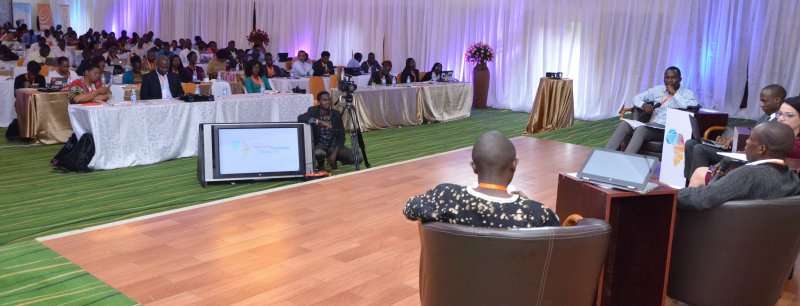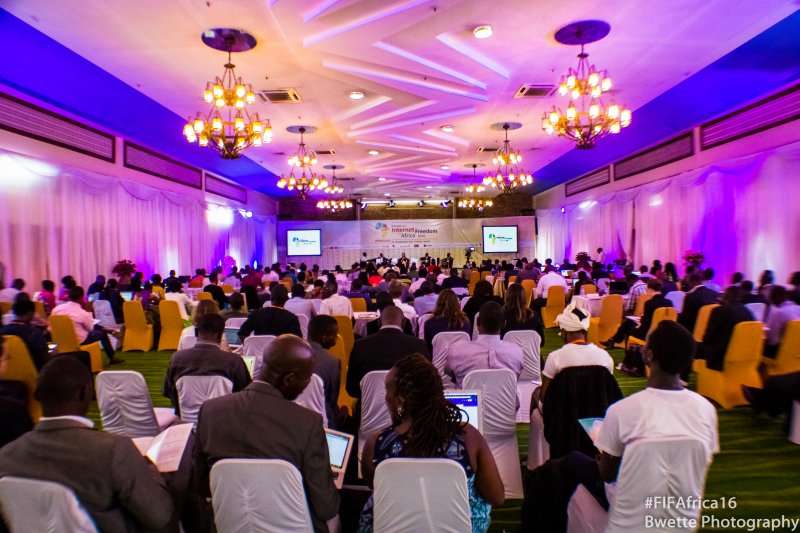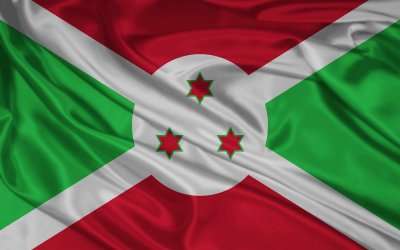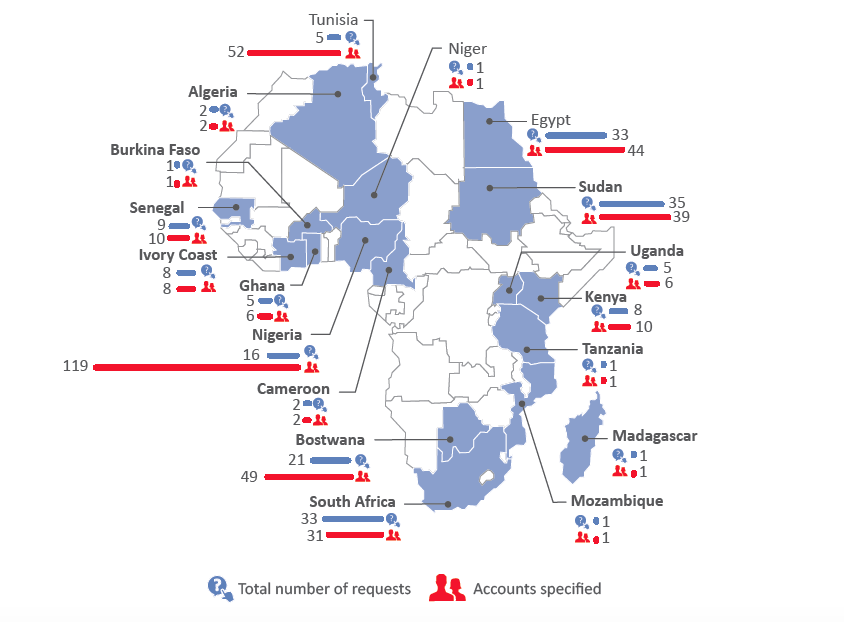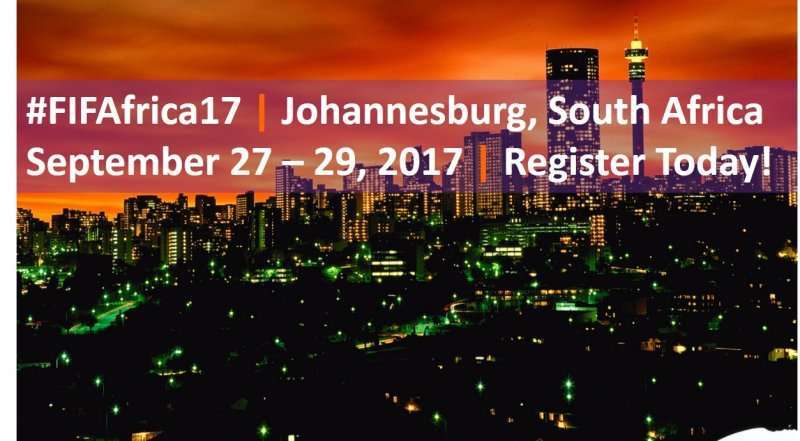Press Statement |
On September 27–29, 2017, the Forum on Internet Freedom in Africa 2017 (FIFAfrica17) will be held in Johannesburg, South Africa. The landmark event convenes various stakeholders from the internet governance and online rights arenas in Africa and beyond to deliberate on gaps, concerns and opportunities for advancing privacy, access to information, free expression, non-discrimination and the free flow of information online.
This year’s convening that is organised by the Collaboration for International ICT Policy in East and Southern Africa (CIPESA) and the Association for Progressive Communications (APC) brings together up to 250 participants from more than 35 countries. This is the first time that FIFAfrica is hosted outside of Uganda where it has been held since its inception in 2014. The Forum’s expanding footprint mirrors the growing popularity of the event which launched with 80 participants.
More than 40 speakers representing a diversity of organisations have been lined up for FIFAfrica17, including from the Berkman Klein Center for Internet & Society at Harvard University, Nigerian social enterprise Paradigm Initiative, Zambian tech accelerator BongoHive, Jamii Media, a Tanzanian company that runs one of the most popular online discussion boards in in East and Central Africa, media rights organisation International Media Support, the University of the Witswatersrand and University of Oxford. Others include global internet advocacy groups Access Now, Small Media, the Internet Society, the Kenya ICT Action Network (KICTANet) and Global Partners Digital. The search engine Google and social networking site Facebook will also be present as will various development foundations and organisations.
Recognised as one of the top Africa tech-preneurs in Africa, Rebecca Enonchong, founder of the global enterprise application solutions provider AppsTech, will give a keynote address and also share insights as a panellist, on big data in Africa.
Launch of State of Internet Freedom in Africa 2017 Report
Documenting the factors that impact upon internet freedom is a key component of CIPESA’s work. Over 20 reports on select countries have been produced since 2014, giving in-depth insight and accounts of the state of internet freedom. Additionally, three reports which give thematic insights have been produced including in 2014 when the Policies And Practices Defining Internet Freedom in East Africa were investigated. In 2015 the report presented a Survey on Access, Privacy and Security Online. Last year’s report looked at the “Strategies African Governments Use to Stifle Citizens’ Digital Rights.
In 2017, the report looks at the grey area that telecommunication service providers navigate when trying to remain profitable and meet their clients’ demands while adhering to legal obligations to the state – often at the cost of users’ freedom of expression and the right to privacy and to access information.
Recognising Access to Information
The Forum will serve as a platform to mark the second year of the International Day for Universal Access to Information (IDUAI), in partnership with UNESCO Regional Office for Southern Africa. Speakers shall include representatives from the Southern African Development Community, media houses and the UNESCO Regional Director for Southern Africa.
About the Forum on Internet Freedom in Africa 2017 (FIFAfrica17)
Thematic discussions FIFAfrica17 are built around themes drawn from the 13 principles of the African Declaration on Internet Rights and Freedoms (www.africaninternetrights.org).
FIFAfrica17 will also feature digital security clinics hosted by Access Now and DefendDefenders, who will provide on-site advice and support on tools to secure digital devices and communications.
Pre-events at the Forum (to be held on September 26 and 27) include a Digital Tools Localisation Sprint hosted by the Localisation Lab which aims to advance the adoption of Internet freedom tools in Africa through translation of technologies and creation of key resources to support the education, training, and adaptation of digital security and circumvention tools. A workshop on Strategic Digital Rights Litigation hosted by the Berkman Klein Center for Internet & Society at Harvard University aims to build capacity on the use of litigation as an effective tool in removing restrictions on the free flow of information online in countries with repressive internet regimes. The workshop will encourage internet activists to collaborate across disciplinary silos to more effectively push back against legal frameworks that are not conducive to a free and open internet. The APC, CIPESA and Small Media will also host a workshop on Human rights review mechanisms, which will take participants through African and UN Periodic Reviews processes.
The Forum will be held at Sunnyside Park Hotel, Princess of Wales Terrace & Carse O’Gowrie Rd, Parktown, Johannesburg, South Africa.
Additional information on the evolution of the Forum can be found at www.internetfreedom.africa
For more information contact [email protected] or Juliet Nanfuka: +256 77 394 9345
Update: Forum on Internet Freedom in Africa 2017
FIFAfrica17 |
The Forum on Internet Freedom in Africa (FIFAfrica) 2017 is now just a few weeks away and indeed, we are working to ensure the delivery of an insightful, engaging Forum. As such, below are some updates and key information to facilitate your planning and participation at the Forum.
Venue
The Forum will be hosted at Sunnyside Park Hotel, located on Princess of Wales Terrace & Carse O’Gowrie Road, Parktown, Johannesburg, South Africa.
Registration and travel support
Thank you for indicating interest to attend the Forum. We are really excited about the diversity and profile of those expected to be in attendance. The deadline for applications for travel support was August 30, 2017 and we received over 200 applications for travel support to participate at FIFAfrica. Review of applications for travel support is ongoing and successful applicants are being contacted directly on a rolling basis. All successful travel support applicants will have received direct communication by September 8, 2017.
Travel Advisory
A travel note is available to enable planning for your attendance of the Forum. For self sponsored participants that require a visa letter, please email [email protected] and copy [email protected].
Session Proposals
We have received many insightful session proposals! Thank you for the numerous submissions. The session review committee worked meticulously to go through each and every submission made and as such, finalisation took slightly longer than anticipated, our apologies for the delay. Below are the successful proposals that have been integrated into the agenda. Please note that some session proposers have been shortlisted as panelists on different sessions after each of their proposals was found to be in resonance with the FIFAfrica themes and integrated into the session that made it to the agenda. We will be reaching out to those individuals directly and also sharing the working draft of the agenda in coming days.
Successful Panel Discussion Submissions
Catalysts for collaboration in strategic digital rights litigation – Nani Jansen Reventlow, Berkman Klein Centre for Internet and Society at Harvard Law School
Innovation and Security in Somali Territories – Nicole Stremlau, University of Johannesburg/University of Oxford
Elections and Technology – Arthur Gwagwa and Moses Karanja, CIPIT (Kenya)
Freedom Online Coalition Meeting – US Department of State and Global Partners Digital (GDP)
Advancing a gender-sensitive approach to ICT Policy and decision making – Moses Owiny, Women of Uganda Network (WOUGNET)
Building research capacity in internet measurements, cyber policy and digital rights – Chenai Chair, Research ICT Africa and Amreesh Phokeer Afrinic
Women’s safety online – Twasiima Patricia, Chapter Four (Uganda) and Betty Abah, CEE-Hope (Nigeria)
Privacy & Freedom of Expression – the Dilemma – Mariam Shinn, Parliament of South Africa & Ministry of Telecommunications and Postal Services and Michael Ilishebo, Zambia Police Service
The Politics of Technology in Africa – Iginio Gagliardone, Wits University (South Africa)
Digital Security Clinic – Access Now and Defend Defenders
Risk Assessment for CSOs – Access Now and Defend Defenders
Keep up with #KeepItOn – AccessNow
Successful Lightning talks
Sex and Sexuality Online in Africa – Koliwe Majama (Zimbabwe)
Internet in a fragile context: the case of Somalia – Abdi Hakim (Somalia)
Free wifi in Africa: philanthropic technology or cynical marketing ploy? – Affagnon Qemal (Benin)
Grassroots communities, youth and internet freedom – Thomas Sithole (Zimbabwe)
Improving the privacy and security of journalists, and activists in DR Congo – Narcisse Mbunzama (DR Congo)
Data Visualisation – Berhan Taye (Ethiopia)
FIFAfrica17 Pre-events
In the lead up the forum we have a series of events taking place by invitation and by registration. Follow the links below to read more about the pre-events and to confirm attendance. Please note that due to their time slots, it will not be possible to attend both events.
#FIFAfrica17 Pre-Event: Human Rights Review Mechanisms Workshop
Background: Do you want to build an understanding of the value of using human rights mechanisms? Do you want build the skills necessary and to learn how to use these mechanisms to hold states and other actors accountable for upholding human rights? Join this whole day workshop hosted by the Association of Progressive Communications (APC), the Collaboration on International ICT Policy for East and Southern Africa, and Small Media which will aim to broaden the network of players upholding human rights across Africa.
#FIFAfrica17 Pre-Event: Strategic Digital Rights Litigation Training Workshop
Background: Litigation is an effective tool that can assist in removing restrictions on the free flow of information online in countries with repressive internet regimes. Yet, it is often under-utilized because of a lack of effective collaboration between different actors: lawyers, activists, academics and technical experts. This workshop, hosted by the Berkman Klein Centre for Internet and Society at Harvard Law School and Media Legal Defense Initiative (MLDI) seeks to encourage internet activists to collaborate across disciplinary silos to more effectively push back against legal frameworks that are not conducive to a free and open internet.
#FIFAfrica17 Pre-Event: Digital Tools Localisation Sprint
Background: As more Africans come online, many local languages remain offline – particularly those which communicate information about digital security tools and applications. Join this workshop which will explore the use of local languages in the area of digital security. A key output will be the establishment of a technical glossary by language. The workshop will be hosted by the Localisation Lab.
Stay tuned for more updates and please continue sharing your thoughts on internet freedom using the #InternetFreedomAfrica hashtag. The event hashtag will be #FIFAfrica17.
Universal Periodic Review: Civic Groups Urge Burundi to Respect Free Expression
By Edrine Wanyama and Kesa Pharatlhatlhe |
The Collaboration on International ICT Policy for East and Southern Africa (CIPESA) alongside Article 19, the East Africa Law Society, the Pan African Lawyers Union (PALU) and DefendDefenders have called for repeal of Burundi’s Penal Code and the 2015 Press Law to address provisions that undermine freedom of expression. In a submission to the third cycle of the Universal Periodic Review (UPR) of Burundi to be considered in January 2018, the five organisations highlighted the worsening situation for freedom of expression and association in Burundi since its last UPR in 2013.
The organisations stress the need for the Burundi government to reopen closed radio stations, create an enabling environment for media freedom, and refrain from attacks against journalists and critics. Additionally, the submission called for the establishment of an independent body to conduct thorough investigations into crimes of violence against journalists and opposition leaders.
The UPR submission covers the legal and regulatory framework on freedom of expression, including restrictions on press freedom, restrictions on freedom of assembly and association as well as freedom of information online and offline in the East African country.
Despite recommendations made to Burundi in the second cycle of the UPR to ensure that these rights are upheld in line with international standards, it continues to maintain a repressive regime. The government has enacted draconian legislation and severely curtailed citizens’ fundamental human rights and basic freedoms.
Article 31 of the country’s constitution guarantees the protection of freedom of expression but it has been undermined by the government’s restrictions on the media, failure to reform existing laws that violate freedom of expression such as the Penal Code Act, and the enactment of laws such as the 2015 Press Law that do not conform to international human rights standards.
In its second review, Burundi received numerous recommendations to safeguard journalists against violence and harassment and to guarantee that journalists and human rights defenders have the freedom to carry out their work independently and without fear of persecution, prosecution or intimidation. However, the country has failed to implement these recommendations. The situation is by the lack of an independent judiciary and law enforcement authorities that condone violations of these rights.
In the latest submission, it is highlighted that the media regulatory body – the National Communications Council (Conseil National de la Communication) lacks independence from the executive and wields broad powers to regulate all media. Additionally, access to information is limited due to the absence of an access to information law..
The submission notes continued efforts to control and limit the online flow of information. It cites cases of government-initiated internet blockages and the arrests of social media users. Further, the introduction of mandatory SIM card registration leaves user information vulnerable to abuse in the absence of a data privacy and protection law.
The report notes that there remain restrictions to freedom of assembly and association including limiting opportunities to demonstrate against the ruling party. Towards the end of 2013, Burundi enacted Law 1/28 to, regulate public demonstrations and assemblies, which contravenes the country’s ’s constitutional guarantees under Article 19 and 32.
The report also notes that the Burundi government has failed to fully implement freedom of assembly and association as outlined in the International Covenant on Civil and Political Rights to which it is party.
The submission thus echoes recommendations made in the previous UPR round in 2013 and calls for legal reform in the areas of press freedom, freedom of expression and access to information. Additionally, the submission urges Burundi to refrain from blocking access to social media platforms and to repeal legislation on SIM card registration which violates privacy and freedom of expression.
Echoing the 2013 submission, there is also a call for private media establishments shut down by the government to be reopened. The submission also calls for the immediate release of journalists who are in detention and an end to the harassment and persecution of journalists and human rights defenders. This is in the wake of the 2016 indefinite suspension of operating permits of five civil society organisations and five media organisations, including the Burundi Union of Journalists. Additionally, the submission calls for an independent body to regulate the communications sector, in accordance with international and regional freedom of expression standards.
The report calls for the enactment of a right to information law so as to enhance transparency and accountability in governance.
Read the full submission here.
The Growing Trend of African Governments’ Requests for User Information and Content Removal From Internet and Telecom Companies
Policy Brief |
The relationship between communications service providers, users and governments with regards to data protection, requests of user information and content take downs is increasingly taking centre stage in discussions around free, open and secure use of digital technologies.
In February 2017, Millicom issued its second Law Enforcement Disclosure Report. Millicom’s report is one of many by private companies aimed at promoting transparency and accountability, through periodically publishing reports detailing information on government requests for user data, content removals, and compliance with those requests.
Google is credited with being the first internet company to publish a transparency report back in 2009, followed by Twitter in 2012. Facebook and Yahoo have published reports since 2013. Vodafone and Orange were among the first telecommunications companies to publish transparency reports, both in 2014.
These reports have become vital to understanding censorship, surveillance and more importantly the commitment of service providers to protecting the privacy of their users and promoting freedom of expression online. Based on the reports alone, it remains unclear what the true extent of governments’ surveillance of citizens’ communications and censorship of content across the world is. Nonetheless, the reports indicate a growing trend among countries, including African governments, of requests for subscribers’ data and content removal.
On the social media front, from five African countries being listed by Facebook among those that requested users’ details in the first half of 2013, the number on the continent has grown to 18 as at the end of 2016. Meanwhile, requests to remove content from Google have also grown from only Libya in 2010 and 2011, to four African countries in 2016 alone. Twitter, which only received one user information request from South Sudan in 2012, has since gone on to receive requests from an additional four countries on the continent. The countries which have consistently made requests for user information to Google, Facebook and Twitter include South Africa, Nigeria, Sudan, Kenya and Egypt.
In telecommunications, figures are scanty as only four companies operating in Africa issue transparency reports – one of which, MTN, does not disclose any statistics while Vodafone’s extent of disclosure is limited due to legal provisions in some of its countries of operation that prohibit publishing of such information. Even then, user data requests from five African governments to Millicom have increased from 5,000 in 2015 to nearly 7,000 in 2016. Requests to Orange from the 20 African countries where it had operations as at the end of 2016 have tripled in the past three years – from 22,930 in 2014 to 67,718 in 2016.
In this brief, we provide a summary of the user data and content removal requests which governments in Africa have made to select internet and telecommunications companies in recent years.
Join us at the Forum on Internet Freedom in Africa 2017 (FIFAfrica17): Register Today!
Register and join those who already have set their sights on joining us at #FIFAfrica17 as we continue to advocate for an internet that is free, secure and open. We have received many session proposals and suggestions but are still open to receiving a few more. As you register, you are still welcome to add your suggestion – we’ll try our best to find a way of addressing the topics you raise. Successful session proposals will be listed on the Forum webpage on August 10, 2017.
Travel Support
Last year we received over 400 applications for travel support of which we were able to support less than one-fifth of the applicants. Our vision is to have a Forum with representation from as many countries in Africa as possible. As part of the registration process, we make room for interested participants to submit an application for travel support.
Exhibit at #FIFAfrica17
Participation in the Forum takes various forms. Some want to talk, others want to listen and some want to show what they do. We are expanding exhibition space at the Forum and are thus inviting proposals from individuals,organisations and companies who wish to showcase their work, projects and products at #FIFAfrica17. The exhibition opportunity is free but we encourage a voluntary contribution to enable us ensure that the #FIFAfrica17 experience is as insightful as it is memorable. Please follow this link and let us know your exhibition idea.
#FIFAfrica17 is co-hosted by the Collaboration on International ICT Policy for East and Southern Africa (CIPESA) and the Association for Progressive Communications (APC)

